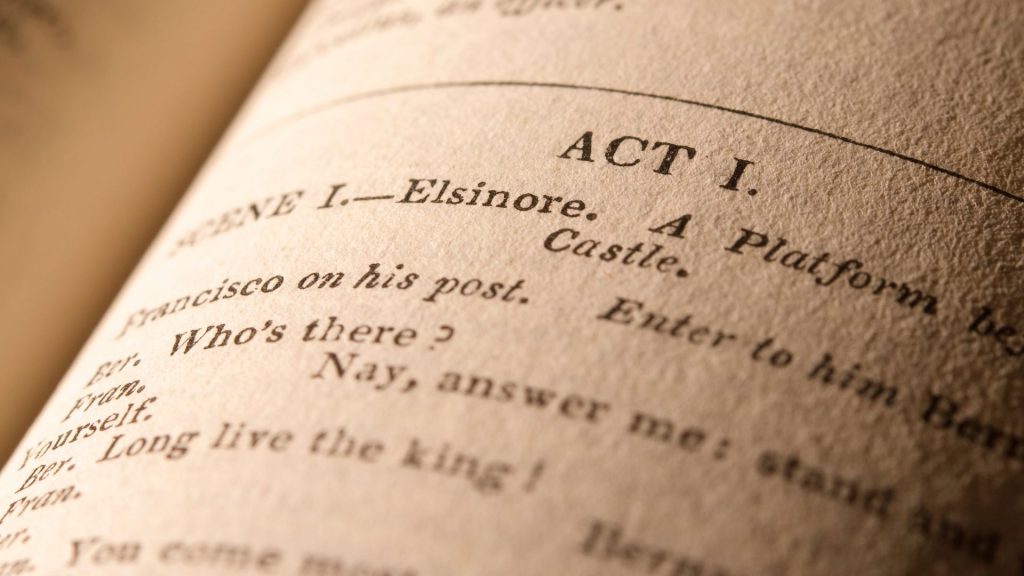Turn your passion for a stage play into a powerful skill. Learn the techniques to craft unforgettable stories that will entrance, enchant and thrill.
September arrives, as does autumn, and my thoughts return to the comfortable embrace of live theatre and a nourishing stage play.
You’ll find me scanning the “30 cultural events of the autumn” features in the newspapers, adding ideas to my calendar and wondering how I’m supposed to afford tickets to any of them.
(Actor David Tennant is right. A decent theatre seat in the West End is around £150 and the lowest prices are about £40 and that’s with an element of a restricted view. How is that remotely possible for anyone but the wealthy?)
Never mind. The play’s the thing. And King Lear with Kenneth Branagh at Wyndham’s is already in my calendar and I have my beady eye on Pygmalion at the Old Vic.
I have fond memories of Jerusalem, The Curious Incident of the Dog In The Night-Time, The Habit of Art, Death of A Salesman, Chimerica, Constellations, Hamlet…
Not just the stories or the performances but the experience.
So what makes for a memorable stage play?
What constitutes a remarkable play? Is it the characters, the plots, the wisdom conveyed, or some indefinable essence that captures the human experience?
It encompasses all these elements and more and it is in the blurred regions round the edges of these qualities that a splinter of the truth can be found – an indefinable place where everyone can see their own authentic self.
Where do I start with a stage play?
So how do you go about mastering this testing craft?
If you write books, read books. If you write films, see films. And so it follows that playwrights must watch plays (try a local or fringe theatre to keep the costs down). Study the mechanics, the possibilities, the limitations. Calibrate the space, take the measure of live action with all its power and intimacy.
Understand the magic. Re-live those indelible moments that last a lifetime (“you can’t handle the truth!”) and take them apart. What went before to make them so thrilling and alive? How did the writer build momentum through pace and character and tension?
- Hooked from the start: The art of a great play opening
- 9 brilliant (and practical) tips on how to tell a great story
- Unmasking the tale: novel writing vs script writing showdown
Consider volunteering at your local theatre to understand, literally, how the space works. Indeed, watching a play five times over a week pushes you beyond the distraction of the magic and into the grubby and prosaic underpinning. When you know the lines as well as a character you can see how the actor makes them come alive from the page – the pacing, the rhythm, the pauses.
This is vital because theatre, shorn of realistic spectacle, relies on the tricking of the imagination and the art of subtlety – the seeds you plant in the text blossom in the audience’s imaginings.
How do I construct a stage play?
And because of this, think of Aristotle’s Poetics – the unities of time, place and action. And the basics of story, beginning, middle and end through rising action. This austerity of ingredients focusses the mind. No car chases, but a forensic exploration of a character in crisis.
All in front of a live audience that might be listless, fidgety, uncomfortable, hot, hungry – an audience that wants to enter your world but still needs to be lured there as the curtain rises.
People must be engaged with what’s happening on stage to truly absorb your message. Dive into the action swiftly and keep your audience hooked. A character’s motivation must be relatable and understood. The audience must know, in concrete terms, what the protagonist desires so he or she can judge the scale of the conflict, the size of the opposition, the magnitude of the risks.
If plays turn wordy – dinner table debates are a staple – there should be a sufficient through line, a curiosity about outcome, so the audience hangs in there. They must be rooting for a character and determined to see their journey through to the end.
Pursue authenticity
And these characters aren’t the 2D cyphers of a superhero movie, required to do little more than spout cliches in between setpieces. Your audience is going to spend the evening with your characters and they are going to be talking a lot – without a right of reply from the Upper Circle.
Everything about them must be authentic and contain a truth.

You may need to write characters with different backgrounds and experiences from your own. Thoroughly understand their lives, including their homes, careers, education, age, beliefs, political inclinations, and social behaviour.
Give them flaws. No-one minds a hero who has a dark streak or a weakness. Even better, in fact, because they are relatable and human and their flaws draw them to interesting places, psychologically and physically. The battle between someone’s devils and their better angels is at the heart of good drama.
Capture the human condition
And it is a splinter of the human condition that you hope to glimpse, touching on universal themes like family, love, and death, allowing audiences to connect with and reflect on their own experiences. That is where the magic lies, when your fictional creation resonates with people you’ve never met to create a union of thought and emotion.
Above all, have something to say. Not on a soapbox, shouting, but illustrated through your characters and a hundred major and minor decisions they make during their two hours’ journey. Tell a story, bring it to life, capture a heart.
Oh, and by the way, learn how to format your playscript. Here’s a guide from the BBC to help you do that.
3 Shakespeare quotes about the stage
- “O for a Muse of fire, that would ascend the brightest heaven of invention!” – From Henry V, Prologue.
- “Life’s but a walking shadow, a poor player That struts and frets his hour upon the stage And then is heard no more. It is a tale Told by an idiot, full of sound and fury, Signifying nothing.” – From Macbeth, Act V, Scene V.
- All the world’s a stage, And all the men and women merely players; They have their exits and their entrances; And one man in his time plays many parts.” – A paraphrased variation from As You Like It, Act II, Scene VII.
7 of the greatest plays of all time
- Hamlet by William Shakespeare: This tragic masterpiece explores themes of revenge, madness, and the human condition. It’s known for its complex characters and iconic soliloquies, making it one of Shakespeare’s most celebrated works.
- The Importance of Being Earnest by Oscar Wilde: Oscar Wilde’s witty and satirical comedy is a classic of British humour. It’s a clever exploration of social class, identity, and the absurdity of social conventions. The play is known for its sharp wit, memorable characters, and delightful wordplay.
- Look Back in Anger by John Osborne: A pivotal work in British drama. It is considered one of the defining plays of the “Angry Young Men” movement in post-war Britain. The play features a working-class antihero, Jimmy Porter, and addresses themes of class, marriage, and disillusionment.
- Pygmalion by George Bernard Shaw: A witty and thought-provoking play that explores issues of language, social class, and identity. It tells the story of a phonetics professor who transforms a Cockney flower girl into a refined lady through speech and manners training.
- A Man for All Seasons by Robert Bolt: Based on the life of Sir Thomas More, a 16th-century English statesman and lawyer, the play examines themes of morality, integrity, and the clash between personal conscience and political authority during the reign of King Henry VIII.
- A Streetcar Named Desire by Tennessee Williams: This American classic delves into the psychological turmoil of its characters, particularly Blanche DuBois, as they grapple with desire, illusion, and reality. It’s a powerful examination of human fragility.
- Death of a Salesman by Arthur Miller: This play is a critique of the American Dream and the pressures of modern society. It tells the story of Willy Loman, a struggling salesman, and his family’s disintegration.

